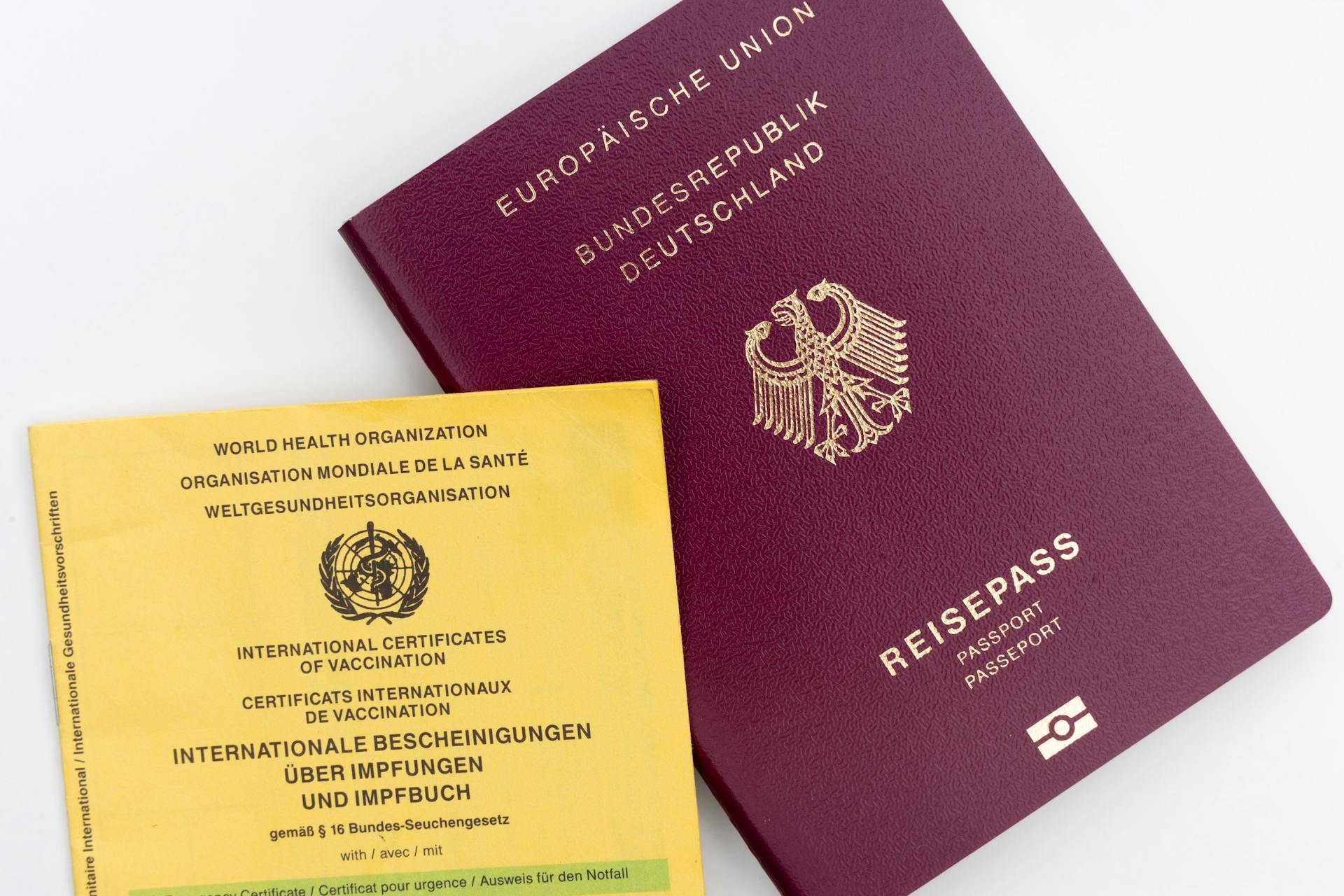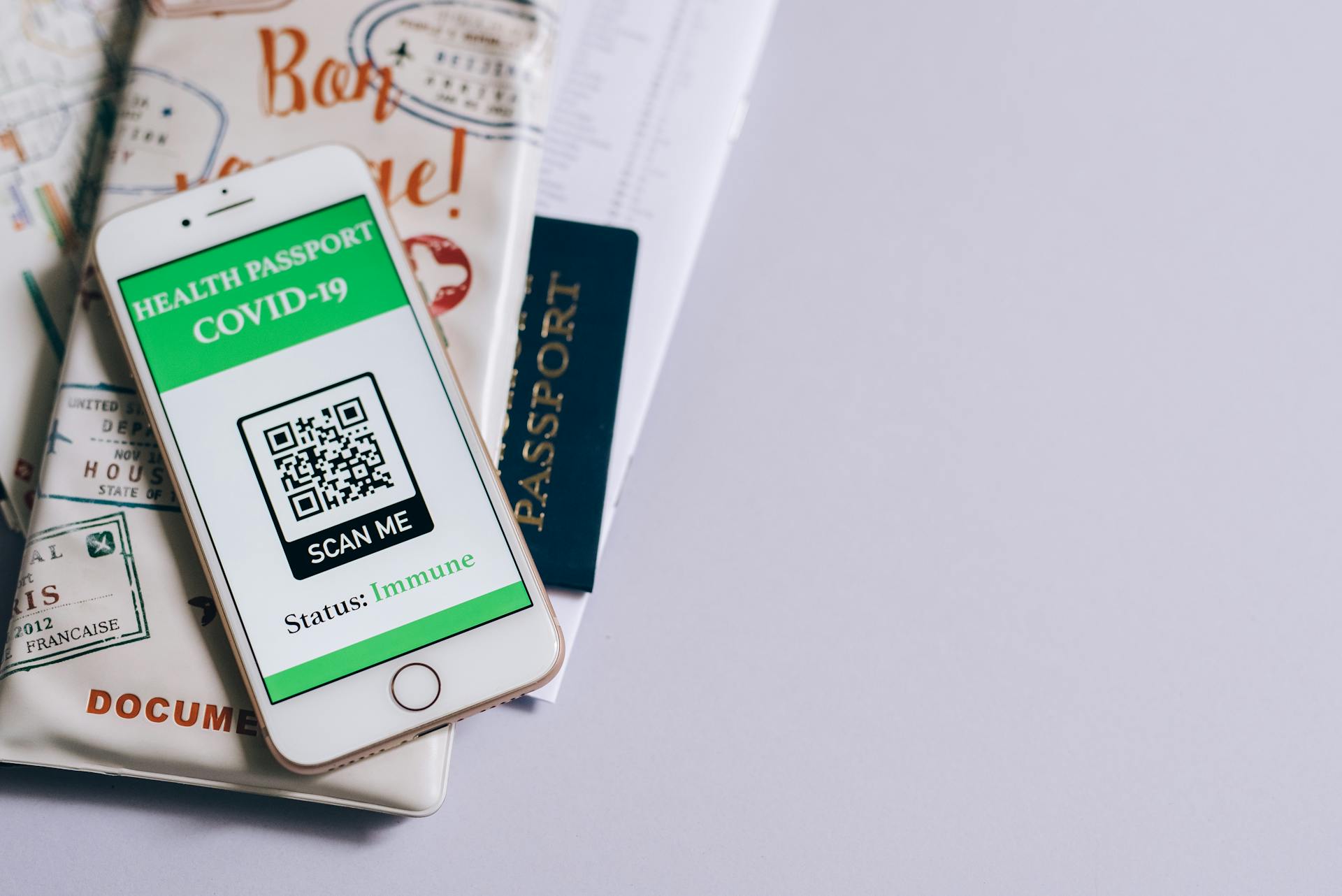
Trip cancellation and interruption insurance can be a lifesaver on your next vacation. This type of insurance can reimburse you for non-refundable trip expenses if you need to cancel or interrupt your trip due to unforeseen circumstances.
Most policies cover trip cancellations due to reasons such as illness, injury, or death of a traveler or a family member.
Travelers should carefully review their policy to understand what's covered and what's not. For example, some policies may not cover pre-existing medical conditions.
Trip interruption insurance can also reimburse you for additional expenses incurred due to a trip interruption, such as the cost of a last-minute flight or accommodation change.
For more insights, see: Does Travel Insurance Cover Cancellation Due to Illness
What Is Trip Cancellation Insurance?
Trip cancellation insurance is a type of insurance that reimburses you for prepaid trip expenses if you need to cancel or interrupt your trip due to unforeseen circumstances.
It's usually a non-refundable expense, so having trip cancellation insurance can be a lifesaver. For example, if you've already paid for your flight, hotel, and rental car, but you need to cancel your trip due to illness or injury, the insurance can help you recover those costs.
Most trip cancellation insurance policies cover a wide range of reasons for cancellation, including illness, injury, death of a family member, or even natural disasters like hurricanes or earthquakes. Some policies may also cover trip interruptions, such as being stuck in a foreign country due to a flight delay or cancellation.
Typically, you'll need to purchase trip cancellation insurance within a certain time frame, usually when you book your trip or pay a deposit. This ensures that you're covered in case something unexpected happens.
Types of Trip Cancellation Insurance
There are several types of trip cancellation insurance policies to choose from.
Single-trip policies cover one trip and are ideal for those taking a one-time vacation.
Annual multi-trip policies cover multiple trips throughout the year and are perfect for frequent travelers.
Cancel for any reason (CFAR) policies allow you to cancel your trip for any reason, not just those covered under standard policies.
This type of policy often comes with an additional fee, but it provides more flexibility and peace of mind.
A unique perspective: Travel Insurance Cancellation for Any Reason
What's Covered

Trip cancellation insurance covers a wide range of unforeseen circumstances, including injuries that necessitate medical treatment and prevent you from taking your trip, death of your traveling companion, inclement weather, jury duty, terrorist incidents, job termination, and other extraordinary events.
If you're unable to take your trip due to one of these reasons, you may be able to get your entire prepaid, nonrefundable trip cost back, as long as the entire amount was insured. This can be a huge relief, especially if you've spent thousands of dollars on flights, hotels, and excursions.
The maximum benefit amount for Trip Cancellation and Interruption Insurance is $10,000 per Covered Trip and $20,000 per Eligible Card per 12 consecutive month period. This means that if you have a premium travel credit card, you may already have trip cancellation insurance as a benefit.
Covered costs for trip cancellation include unused and forfeited prepaid, non-refundable trip costs, cancellation penalties, and higher per-person trip costs for you if your travel companion cancels for a covered reason (single supplement).
Curious to learn more? Check out: Credit Cards with Travel Health Insurance
Here are some examples of covered costs for trip cancellation:
- Unused and forfeited prepaid, non-refundable trip costs
- Cancellation penalties
- Higher per-person trip costs for you if your travel companion cancels for a covered reason (single supplement)
Covered costs for trip interruption include unused, prepaid, nonrefundable trip costs, additional transportation costs to join, rejoin, or transport you to your originally scheduled return destination, and coverage up to 150% of trip cost (up to 100% for the Essential plan).
Covered Reasons
If you have trip cancellation insurance, injuries that necessitate medical treatment and prevent you from taking your trip qualify as a covered reason.
Death of your traveling companion is also a covered reason, which can be a huge relief if you're planning a trip with someone and they suddenly pass away.
Inclement weather that results in disrupted service is a covered reason, so if your flight is grounded due to a storm, you might be able to get reimbursed.
Terrorist incidents, job termination, and jury duty are all considered extraordinary events that qualify as covered reasons for trip cancellation insurance.
Review the fine print of your policy to see exactly which reasons are covered, as not all policies are the same.
Consider reading: Trip Cancellation Insurance Covered Reasons
Covered Costs

Covered Costs are a crucial aspect of trip insurance, and understanding what's covered can help you make informed decisions about your travel plans.
If your trip is cancelled for a covered reason, you may be reimbursed for unused and forfeited prepaid, non-refundable trip costs, as well as cancellation penalties.
Higher per-person trip costs for you if your travel companion cancels for a covered reason (single supplement) are also covered.
If your trip is interrupted, you may be covered for unused, prepaid, nonrefundable trip costs.
Additional transportation costs to join, rejoin, or transport you to your originally scheduled return destination or trip are also covered.
Coverage for trip interruption may be up to 150% of trip cost (up to 100% for the Essential plan).
Here's a breakdown of the covered costs for trip cancellation and interruption:
Travel Guard can also help cover the costs of re-booking and assist with re-scheduling your itinerary if you experience a trip delay.
What's Not Covered
If you're considering purchasing trip cancellation and interruption insurance, it's essential to know what's not covered. Trip cancellation insurance won't cover losses arising from self-harm or foreseeable events.
Some common exclusions include acts of war, participating in activities considered dangerous, and felony convictions. You'll also be out of luck if you're pregnant and give birth during your trip.
Here are some specific exclusions you might find in your policy:
- Pre-existing medical conditions
- Self-inflicted injuries
- Getting involved in criminal activities
- Labour disruptions or strikes
- Giving birth to a child during your trip
It's crucial to review your policy's fine print to understand what's not covered, as exclusions can vary between insurers.
What Is Not Covered
Trip cancellation insurance is designed to help you recover from unforeseen circumstances, but it's essential to know what's not covered. Self-harm is not covered by trip cancellation insurance.
You might be surprised to learn that trip cancellation insurance won't cover losses arising from self-inflicted injuries. This includes any harm you cause to yourself intentionally.
Acts of war are also not covered, which means if there's a conflict in your destination country, you won't be able to claim reimbursement. Taking part in activities considered dangerous, such as skydiving or bungee jumping, is also excluded.
A felony is not covered by trip cancellation insurance, nor is childbirth or dental treatment. These are all important exclusions to be aware of before purchasing a policy.
Related reading: Self Insured Plan
Out-of-Pocket Purchases

If you're looking for more protections than what's offered on your credit card, consider purchasing a comprehensive trip cancellation policy out-of-pocket. This can provide coverage for emergency medical expenses, which is not typically included in credit card insurance policies.
Some credit cards may only offer up to $10,000 in trip cancellation and interruption insurance, which may not be enough to cover your prepaid, non-refundable expenses. For example, if you've prepaid for a $20,000 trip, you may need to purchase additional coverage to ensure you're fully protected.
Travel insurance policies from companies like AAA, Allianz, and AIG often have higher coverage limits and more comprehensive benefits. They may also cover additional expenses such as single supplements and higher per-person trip costs if your travel companion cancels for a covered reason.
If you're forced to cancel your trip due to extraordinary circumstances beyond your control, travel insurance will provide coverage for some or all of your non-refundable travel expenditures. Covered events will vary, so be sure to review the terms of any plan you intend to purchase.
Additional reading: Citi Credit Card Trip Cancellation Insurance

Here are some examples of covered reasons for trip cancellation and interruption insurance:
- Sickness, injury, death, or quarantine of a member of your travel party.
- A delay that causes you to miss or interrupt any part of your covered trip due to weather, mechanical reasons, or travel advisory.
- Loss or damage to your baggage and personal effects due to theft, burglary, fire, or transportation hazards.
- Death or emergency hospitalization of your host at the destination.
- Involuntary loss of permanent employment.
Purchasing and Applying
You can apply for trip cancellation and interruption insurance online, and the provider will let you know if you're eligible and provide an estimate of the coverage cost.
The estimate will be based on your response, so it's essential to provide accurate information. If you're satisfied with the estimate, you can proceed to purchase the policy.
The application process is relatively straightforward, and you'll have an opportunity to make an informed decision about your coverage.
Broaden your view: Cyber Insurance Business Interruption Coverage
Applying for TD
Applying for TD Insurance Trip Cancellation and Interruption Plan is a straightforward process. You can apply online and receive an estimate of the coverage cost based on your response.
To be eligible for TD Insurance, you must be a Canadian resident. You also need to be covered by the government health insurance plan of your province or territory of residence during your trip and at the time a claim is incurred.

The minimum age requirement to apply for TD Insurance is 15 days old. Certain medical conditions may make you ineligible for coverage under a selected plan.
Here's a summary of the eligibility requirements:
If you're satisfied with the estimate, you can proceed to purchase the coverage.
Purchasing and Applying
When purchasing trip cancellation and interruption insurance, several factors can affect the cost. The total cost of your trip, including non-refundable purchases like flights and hotels, is a major factor.
The amount of coverage you want to purchase is another important consideration. More coverage typically means a higher premium.
The number of travelers requiring insurance coverage also impacts the cost. This is because each traveler adds to the overall risk of the trip.
Your age and health condition can also affect the cost of the policy. Younger and healthier travelers typically pay less.
The duration of the trip is also a factor in determining the cost of the policy.
A different take: Business Interruption Insurance Cost

Here are some estimated costs of trip cancellation insurance:
Keep in mind that these are just estimates and actual costs may vary depending on the insurance company and other factors.
Frequently Asked Questions
What does up to 100% reimbursement for covered trip cancellation and interruption mean?
Up to 100% reimbursement means you can get back the full cost of your trip if you cancel for a covered reason, but check your policy for details on what's covered
What does trip disruption cover?
Trip disruption cover protects you against unexpected events like pandemics, terrorism, and natural disasters that can interrupt your travels. This optional insurance add-on provides financial support in case of unforeseen disruptions.
Sources
- https://www.travelguard.ca/travel-insurance/trip-cancellation-insurance
- https://www.squaremouth.com/travel-insurance-benefits/trip-cancellation
- https://www.nerdwallet.com/article/travel/trip-cancellation-insurance-explained
- https://www.tdinsurance.com/products-services/travel-medical-insurance/tips-advice/trip-cancellation
- https://www.travelinsured.com/info/trip-cancellation-interruption
Featured Images: pexels.com


